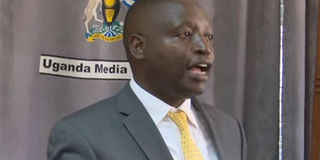Government to collect over Shs100 billion from social media tax this year

State Minister for Finance David Bahati
What you need to know:
- Mobile internet users now have to input a telephone code to pay the tax before they are able to access most social media sites, although implementation has proved patchy with some blocked services still available.
- Business people have been angered too, not least by an associated tax, also imposed at the weekend that charges one percent on every mobile money transaction, a popular way to take payments and distribute salaries.
As Ugandan netizens continue to express concerns over the newly introduced excise duty, government says it expects to collect over Shs100 billion from the infamous social media tax this year.
State Minister for Finance David Bahati says the money will be used to fund government projects.
“We expect to collect some reasonable money. Over Shs1 billion which can do some good work,” Mr Bahati told journalists in Kampala on Tuesday before adding that government was in talks with telecom companies to resolve the issue of one percent tax levied on data bundles purchased through mobile money.
He also revealed that government is considering taxing some of the companies running social media platforms such as Facebook and Twitter.
However, one percent tax on mobile cash deposits will be scrapped because it was effected in error, according to Mr Bahati.
On Sunday, communications regulator, Uganda Communications Commission (UCC) blocked access to social media including WhatsApp, Facebook and Twitter, as well as dating sites Tinder and Grindr, unless users pay a Shs200 ($0.05, 0.04 euro) daily tax.
The outcry was immediate.
"I was in a village on Sunday when the tax started and people were outraged," said Siraje Nsambu, a spokesman for the Tabliq Muslim sect.
"Even a poor boy will [now have to] strive hard to buy a Chinese mobile phone and get online." he said.
Mobile internet users now have to input a telephone code to pay the tax before they are able to access most social media sites, although implementation has proved patchy with some blocked services still available.
Some have turned to virtual private networks (VPNs) to disguise their location and avoid the levy, a trick learned during elections two years ago when the government tried to shut down social media.
Mr Bahati said Tuesday the tax will help pay for "the development of the country" and ordered the communications regulator to stop Ugandans using VPNs, though it is unclear how this directive can be carried out.
President Yoweri Museveni, an avid Twitter user with 855,000 followers, urged the imposition of the tax earlier this year, to put an end to "gossip".
Opponents have given these justifications short shrift.
"The whole idea of the tax is to curtail social media," said singer and parliamentarian Bobi Wine, real name Robert Kyagulanyi, whose election last year was fuelled by social media and who wants the tax abolished.
"The mood is crazy, people are angry!" he said.
"This is not political anymore, it's a social problem and the people are asking for answers."
Business people have been angered too, not least by an associated tax, also imposed at the weekend that charges one percent on every mobile money transaction, a popular way to take payments and distribute salaries.
"My business works on mobile money," said Hannington Bugindo, who runs rents out excavators and construction equipment.
Dozens of the tax protesters, describing themselves as "the young citizens of Uganda", warned in a statement Tuesday that unless the levy is lifted by noon Friday they will "mobilise the country" against it.



